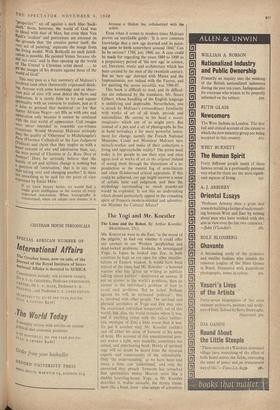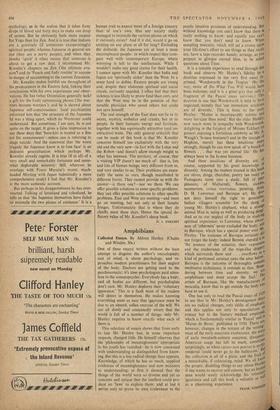. The Yogi and Mr. Koestler Ma. KOESTLER went to
the East, 'in the mood of the pilgrim,' to find out whether it could offer any answers to our Western 'perplexities and dead-locked problems.' Inolndia he investigated Yoga, in Japan he looked into Zen, in both countries he kept an eye open for other manifes- tations of Eastern wisdom. It would have been typical of the times had Mr. Koestler—a battered warrior who has 'given up writing or publicly talking about politics'—discovered an answer. If not an answer to the world's problems, then an answer to the individual's problem of how to avoid such problems. But he failed. Perhaps against his will, he remained 'political': that is, involved with other people. The spiritual and physical acrobatics of Yoga and Zen may take the occasional individual temporarily out of this world; but, alas, the world remains where it was, and if anything (what with the rather militar-, istic mystique of Zen) a little worse than it was. To put it another way, Mr. Koestler couldn't cast off either his sense of humour or his sense of hope. His account of this unsentimental jour- ney makes a light, very readable, sometimes too casual, and entertaining book. Howls of spiritual rage will no doubt be heard from the mystical experts and connoisseurs of the unknowable. Only 'the understanding,' as we have been told many a time, can 'understand,' and only the converted may preach. Someone has remarked that spiritualiSm makes Heaven seem like a shabby boarding-house. Yoga, as Mr. Koestler describes it, makes samadhi, the mystic union, seem like a freak show—plus scraps of schoolboy
mythology, as in the notion that it takes forty drops of blood and forty days to make one drop of semen. But he obviously feels more respect for Yoga than for Zen. And it is true that Indians are a genuinely (if sometimes exasperatingly) spiritual people; whereas Japanese in general are not (they are a nervy people), and when they invoke 'spirit' it often means that someone is about to get a raw deal. I recommend Mr. Koestler's chapters on Zen ('the ultimate eva- sion') and its 'Punch and Judy routine' to anyone in danger of succumbing to the current Zensation.
Mr. Koestler makes fruitful use throughout of his predecessors in the Eastern field, linking their conclusions with his own experiences and obser- vations. He has (what Orientalists generally lack)* a gift for the lively epitomising phrase ('the war- riors became worriers'); and he is shrewd about Japanese self-consciousness: local psychiatrists informed him that 'the structure of the Japanese Id was a thing apart, which no Westerner could understand.' But sometimes, I am sure, he is not quite on the target. It gives a false impression to say these days that 'hara-kiri is treated as a fine art for connoisseurs'—unless one is referring to stage suicide. And the statement that 'the worst tragedy the Japanese know is to lose face' is an indecent generalisation which perhaps Mr. Koestler already regrets. It is true (if at all) of a very small and remarkably fortunate and some- what deplorable minority. Still, wherever he overlaps with Fosco Maraini's recent, much- lauded Meeting with Japan (admittedly a more comprehensive study) I feel that Mr. Koestler's is the more authentic account.
But perhaps in his disappointment he has over- reacted. Talking of lotusland and robotland, he tells us that 'the Japanese themselves have failed to reconcile the two planes of existence.' It is a human trait to expect more of a foreign country than of one's own. Has any society really managed to reconcile the various planes on which it variously exists? And if it did, would it go on existing on any plane at all for long? Excluding the diehards, the Japanese are at least a most uncomplacent people: in which respect they com- pare well with contemporary Europe, where worrying is left to the intellectuals. While I wouldn't make any great claims for their health, I cannot agree with Mr. Koestler that India and Japan are `spiritually sicker' than the West. In a sense hard to define, Eastern people are young and, despite their elaborate spiritual and social rituals, curiously unjaded. I often feel that their sickness is less likely to prove fatal than ours, and that the West, may be in the position of that notable physician who saved others but could not save himself.
The real strength of the East does not lie in its saints, mystics, ?esthetics and cranks, but in its people. In their' fantastic energy and fortitude, together with less equivocally attractive (and un- attractive) traits. The only general criticism that can be made of this book is that Mr. Koestler concerns himself too exclusively with the very old and the very new—in fact with the Lotus and the Robot—and doesn't allow enough weight to what lies between. The territory, of course, that a visiting VIP doesn't see much of: that is, lots and lots of human beings, very different from us, and very similar to us. Their problems are essen- tially the same as ours, though manifested in different forms. They cannot provide us with the answer—is there one?—nor we them. We can offer possible solutions to some specific problems; they can offer possible solutions to other specific problems. East and West are meeting—and must go on meeting, but not only at their lunatic fringes. Unfortunately that is where they do chiefly meet these days. Hence the special de- flatory value of Mr. Koestler's sharp book.
D. 3. ENRIGHT















































 Previous page
Previous page